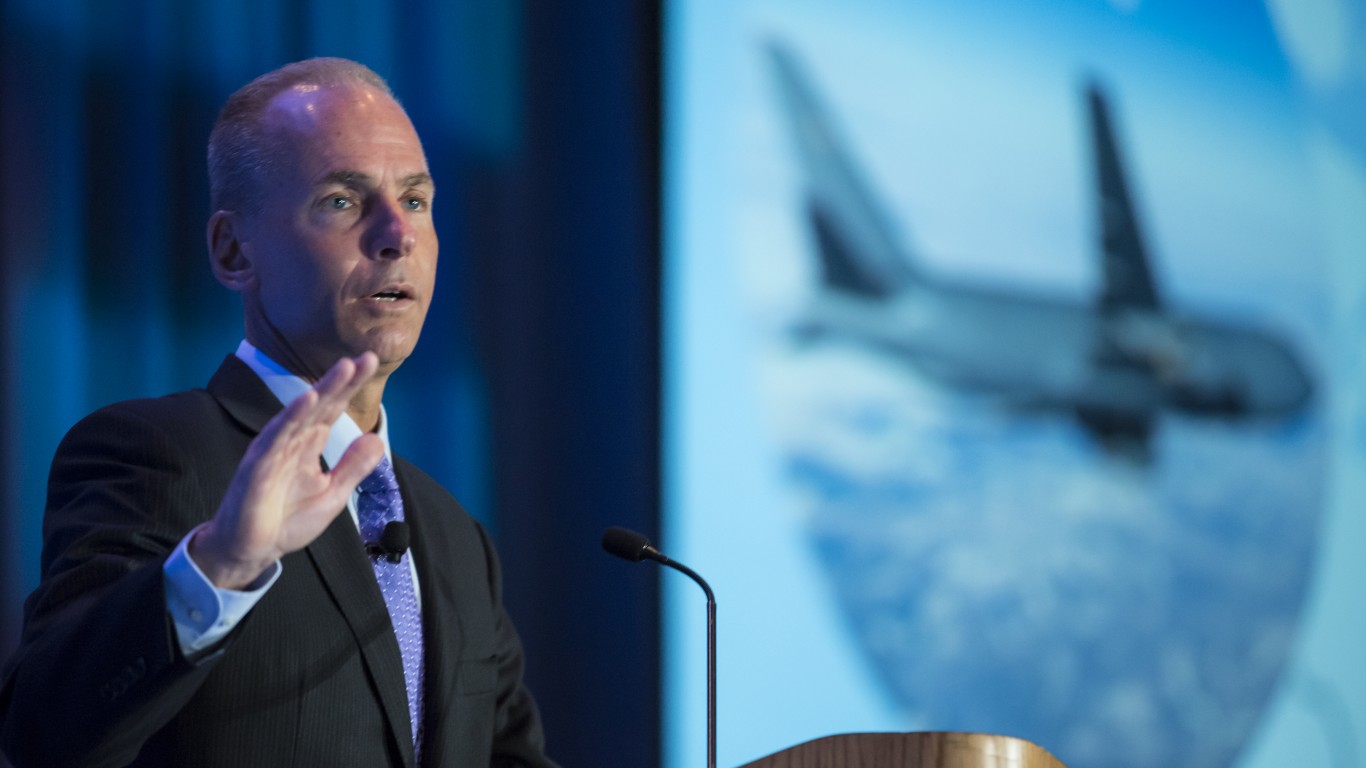
In a “Here’s your hat, what’s your hurry” announcement Monday morning, Boeing Co. (NYSE: BA) said that now-former CEO Dennis Muilenburg has resigned effective immediately and that the company’s board chair, David L. Calhoun, will take over as CEO and president on January 13, 2020.
During the interregnum, Chief Financial Officer Greg Smith will serve as interim CEO. Boeing also said that Lawrence W. Kellner, becomes non-executive chair of the board at once. Calhoun was named chair in mid-October.
Muilenburg has presided over some of Boeing’s best times and one of its worst. The two crashes within a five-month span of the company’s 737 Max passenger jet that killed 346 people led to his replacement as board chair and now to his resignation as CEO in favor of Calhoun.
Calhoun, who was senior managing director and head of private equity portfolio at Blackstone, was previously head of General Electric’s aircraft engine business. He is also credited with turning around the declining fortunes of Nielsen and Caterpillar.
While the handwriting was never on the wall regarding Muilenburg’s ouster as CEO, Boeing didn’t have much choice. Following rancorous appearances before Congress, it became clear that he had lost any influence with government regulators and had no chance to regain it. Boeing announced last week that it would cease production of the 737 Max following nearly 10 months of building and story about 42 new planes a month.
Last week, we also named Boeing the worst-managed company of 2019.
Muilenburg replaced former Boeing CEO James McNerney in July of 2015 at a time that the company was just beginning its climb into the stratosphere. McNerney had been CEO since 2005, and Muilenburg had a 30-year career going at Boeing, where he was chief operating officer before being named to the top job.
At the time of his retirement (at the company’s mandatory age of 65), McNerney told investors that they should not be worried because Muilenburg was unlikely to make significant strategy changes, according to a report at CNBC. That turned out to be too true.
While McNerney was popular with investors, his relationship with Boeing’s unions was contentious and his demands on suppliers to lower costs were not well-received. Muilenburg smoothed over some of the labor issues, but he tightened the screws on suppliers even more.
The big problem, however, was and remains Boeing’s arrogance. For example, the company never believed that Airbus would turn into a real competitor. Even when it did, Boeing consolidated by acquiring McDonnell-Douglas. The two companies had a virtual lock on large passenger planes and competed ferociously for sales and legal rulings. The two have order backlogs of more than four years’ worth, but Boeing’s 737 Max troubles have crushed any enthusiasm among potential buyers, and it’s pretty clear that Muilenburg was not the person to be given the responsibility for making that happen.
In the time that Muilenburg has been CEO, Boeing’s market cap has doubled, even though it’s now down by 25% from its all-time high. The cost of that doubling was finally too high a price for Boeing to continue paying.
Calhoun, who has been on Boeing’s board since 2009, has to shoulder at least some responsibility for the fix that the company is in. Even after Muilenburg’s disastrous performance in Washington, D.C., Calhoun defended him, saying in early November, “From the vantage point of our board, Dennis has done everything right from the beginning.” Uh-huh.
Boeing’s stock traded up about 2.5% Monday morning, at $336.38 in a 52-week range of $292.47 to $446.01.
Take Charge of Your Retirement In Just A Few Minutes (Sponsor)
Retirement planning doesn’t have to feel overwhelming. The key is finding expert guidance—and SmartAsset’s simple quiz makes it easier than ever for you to connect with a vetted financial advisor.
Here’s how it works:
- Answer a Few Simple Questions. Tell us a bit about your goals and preferences—it only takes a few minutes!
- Get Matched with Vetted Advisors Our smart tool matches you with up to three pre-screened, vetted advisors who serve your area and are held to a fiduciary standard to act in your best interests. Click here to begin
- Choose Your Fit Review their profiles, schedule an introductory call (or meet in person), and select the advisor who feel is right for you.
Why wait? Start building the retirement you’ve always dreamed of. Click here to get started today!
Thank you for reading! Have some feedback for us?
Contact the 24/7 Wall St. editorial team.
